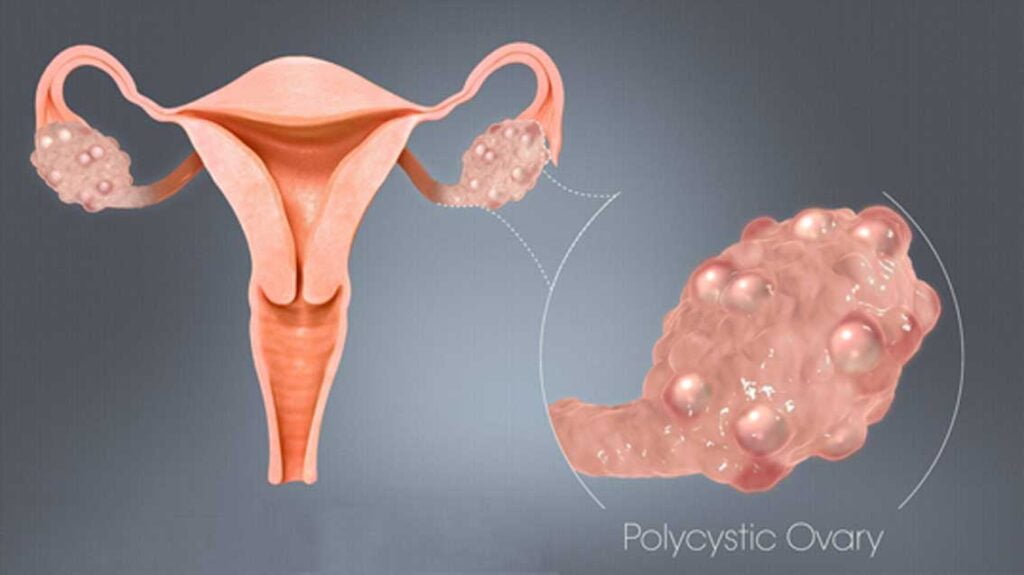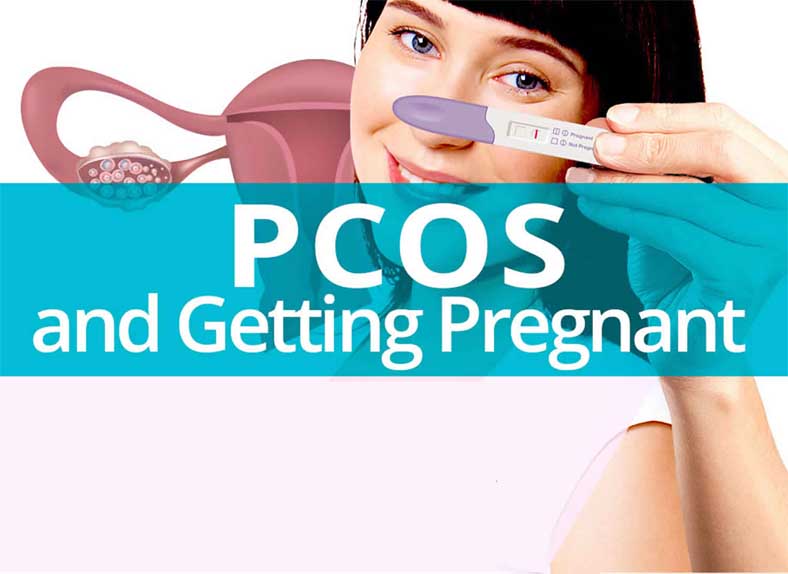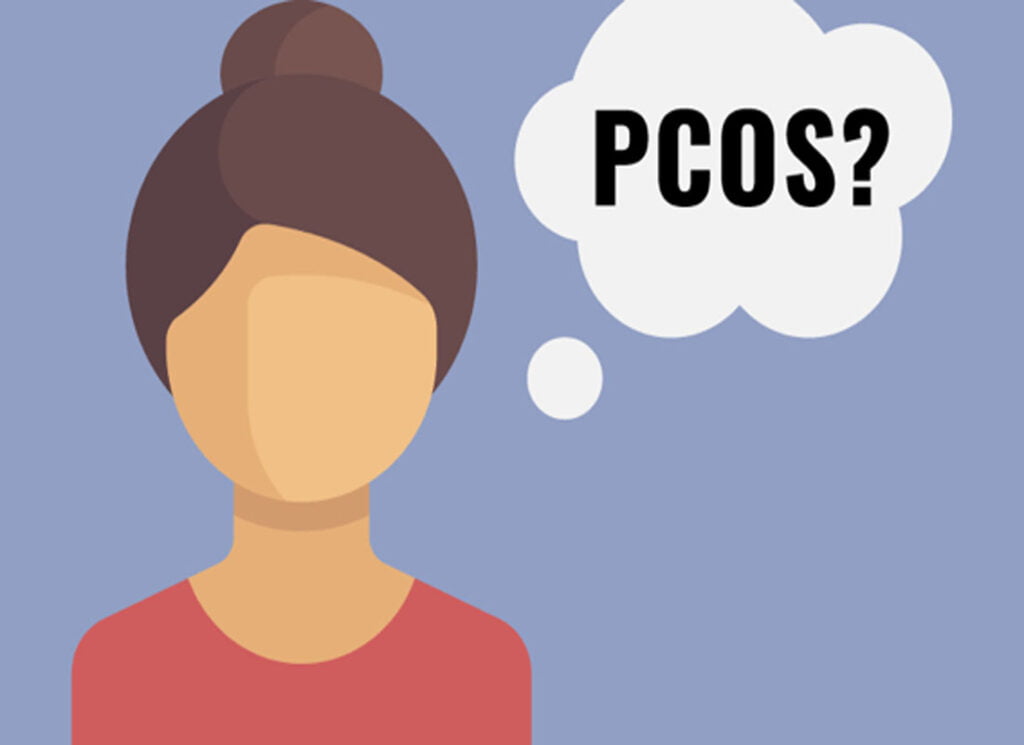What is PCOS?
PCOS (Polycystic Ovary Syndrome) is a hormonal disorder in which many small fluid filled sacs develop at the edge of the ovary and each sack contains immature eggs and those are called cysts. Because of this the ovary becomes large. These eggs never get matured enough to trigger ovulation. According to a journal published on NCBI, worldwide approx. 4% to 20% of women in reproductive age are suffering from PCOS and the proportion of women suffering from PCOS also increased in last 12 years. Here in this article we have covered some necessary facts on PCOS and the Natural Ways to Treat PCOS so that you don’t face any problem in managing the complications.

What Causes PCOS?
Doctors still don’t know the exact reason for PCOS, but the following factors play a key role to trigger PCOS.
Insulin Resistance:
It’s hormone that controls sugar level in our body. If our cells become resistant to insulin then the blood sugar level goes up and because of this our body starts making more insulin. Too much insulin in a woman’s body can cause too much of male hormones production which affects the ovulation process and triggers the PCOS condition.
Genetic Condition:
A family history linked to PCOS may affect the development of this condition.
Inflammation:
Women who have low grade inflammation tend to have PCOS.
PCOS Common Symptoms
The most common PCOS symptoms are:
Irregular Periods:
If you are having irregular periods or having periods which lasts for many days and are heavier than normal then you are possibly suffering from PCOS.
Hair Growth:
High level of male hormones in women’s bodies may result in excess growth of facial and body hair. This condition is called Hirsutism. Severe acne and male pattern baldness also can happen. These are some symptoms of PCOS.
Acne:
Excessive male hormones can make skin oilier than usual and can cause you to develop acne on face, chest and back. If there are excess amounts of acne on your face and body or back then this can be a sign of suffering from PCOS.
Weight Gain:
Around 80% of women who are overweight and obese are suffering from PCOS.
Skin Darkening:
Development of dark patches on the skin which makes your skin look darker can be a sign of development of PCOS in you. Dark patches on the skin can form creases.
How PCOS Affects Your Body?
Infertility:
High amount of male hormone (Androgen) production in women’s bodies can affect fertility and other aspects of health like hair growth on face and chest, weight gain, acne and balding. You can also face problems with ovulating. If you don’t ovulate every month then the chance of getting pregnant decreases.
Metabolism:
Women who are suffering from PCOS tend to produce too much insulin in their body and this can increase androgen production and this increases the chance of obesity, diabetes and metabolic syndrome. Reason why approx. 80% of women around the world with PCOS are overweight or obese.
Sleep Apnea:
This condition causes repeated breathing while sleeping which interrupts sleep. The risk of sleep apnea is high in women who have obesity and PCOS.
Endometrial Cancer:
At the time of ovulation the uterine lining sheds. Due to PCOS if you don’t ovulate in every month then the uterine lining will become thicker and this can increase the risk of Endometrial Cancer.
Depression:
The hormonal imbalance and unwanted hair growth can put an adverse effect on your emotions. This is the reason why many women with PCOS experience depression and anxiety.
Weight Loss and PCOS
PCOS is a result of hormonal imbalance and causes the body to produce more male hormones (Androgen). High amount of production of androgen makes your body gain weight.
Losing weight in this condition can be very challenging but not impossible. It can take a little bit longer than usual but it happens by making a healthy lifestyle and some diet changes.
Can You Have Regular Periods with PCOS?
High levels of male hormones (Androgen) and too much insulin in the body can lead you to irregular monthly cycles of ovulation. However, some women with PCOS can have regular periods, this condition is called Non-traditional PCOS II. In this condition PCOS does not affect their ovulatory pattern.
Can Women with PCOS Get Pregnant?

If you are going through PCOS then it doesn’t mean that you can’t get pregnant. Yes, women with PCOS are more likely to face trouble while conceiving than other women but PCOS is treatable.
On the other hand you also have to understand that the chance of getting pregnant with PCOS is less than normal for women who are above 35 years old and overweight.
PCOS can increase the risk of high blood pressure, gestational diabetes, premature birth and miscarriage during pregnancy. So, if you have PCOS and want to get pregnant then you must consult with your doctor.
By monitoring your PCOS symptoms and blood sugar level you can manage the risk from these complications. This can be controlled by maintaining a healthy lifestyle and consuming the right medicines.
Pregnancy Signs with PCOS
Generally increased fatigue, sore or tender breasts, abdominal bloating, headaches, mood swings, lower back pain, morning sickness are the early signs of pregnancy but if you have PCOS and have irregular periods then you might not get these pregnancy indicator signs.
So if you had unprotected sex 2 to 3 weeks ago and have not had a period or you missed your period more than a month after having unprotected sex then it is worth taking a pregnancy test.
Pregnancy Risk with PCOS
Miscarriage or early loss of pregnancy is the biggest problem for those women who are suffering from PCOS but there are possibilities to have a healthy pregnancy while suffering from PCOS. By making lifestyle and diet changes a woman can become pregnant with PCOS.
Diagnosis
There is no test which can diagnose PCOS. Your doctor can tell you about this by checking your symptoms and medical history and they also can recommend you Pelvic examination, Blood test and Ultrasound.
How Do You Treat PCOS?
PCOS symptoms can be managed by making lifestyle changes, healthy diet/weight management and medication.
Most of the doctors may recommend birth control pills to manage PCOS as these pills decrease androgen production and regularize the menstrual cycle. It is always recommended to consult with your doctor if you have PCOS.
Diet for Polycystic Ovary Syndrome
PCOS symptoms can be managed by making changes in diet and lifestyle.
Reduce Carb Intake:
Consumption of too much carbs supports the production of more male hormones in women’s bodies. You need to reduce the consumption of foods which are high in carbohydrates like white bread, muffins, anything made with flour, sugary snacks and drinks etc. Reduce the consumption of soda and juice which also may contain high amounts of sugar.
You also have to reduce the consumption of foods which can cause you inflammation. Such as French fries, Potato chips, fried chicken or fish. Avoid consumption of saturated fat like butter, Red meat, roast beef or steak, hot dog, alcoholic beverages.
Have Fiber Rich Food:
Consumption of fiber rich foods help you stay full for a long time after a meal. High Fiber diet helps in weight loss which in turn helps in managing the PCOS condition. Fiber rich foods like cauliflower, broccoli and Brussels sprouts, including red leaf lettuce and arugula, red peppers, beans, lentils, almonds, sweet potatoes, berries, winter squash and pumpkin are good for weight loss.
Eat Protein and Healthy Fat:
Protein helps to stabilize blood sugar and protein rich foods reduce craving for carbs which help to burn more calories. Protein rich foods are egg, nut, dairy, meat, seafood etc.
Having healthy fat in your diet like avocado, olive oil, coconut oil and nut butter help you feel more satisfied after a meal and manage weight as well.
Foods for Weight Loss with PCOS
Consumption of right foods can help you lose weight and help managing the PCOS condition. The best diet for weight loss with PCOS includes foods like.
- Omega 3 rich fish such as sardines and salmon.
- Olive oil instead of butter
- Eat Beans and other protein-rich legumes instead of meat.
- Eat plenty of vegetables like spinach, kale, tomatoes, and mushrooms.
- Eat whole grains like brown rice, barley, sorghum which can avoid a spike in blood sugar level.
- Tomatoes, kale, spinach, almonds and walnuts and fruits, like blueberries and strawberries help to reduce inflammation.
Try not to eat processed foods and foods with added sugar. Restricting eating calories may slow down your metabolism, which is why it is recommended to eat more vegetables and fruits. These PCOS friendly foods are not only good for weight loss diet but also great in managing PCOS condition.
Natural Ways to Treat PCOS
There is nothing which can completely cure PCOS but there are some natural ways to treat PCOS to some extent.
Flax Seeds:
Eating flax seeds provides a natural way to treat PCOS. It helps in decreasing the androgen level which is the main cause of PCOS and it also helps in weight reduction. You can add them into your daily diet or directly consume them.
Cinnamon:
It helps to regularize the menstrual cycle. You can add cinnamon to your diet by adding them in water while making tea.
Chasteberry:
Chasteberry contains many medicinal properties which are effective towards many diseases. Chasteberries are effective on insulin resistance and decrease the androgen level.
Cod liver Oil:
It contains Vitamin D, A and Omega 3 fatty acid which can regularize your menstrual cycle and also reduce fat around your waist.
Maca Root:
Traditionally one of the natural ways to treat PCOS. The root of maca plant is a traditional herb which is used to boost fertility and balance hormones.
Licorice Root:
It has an anti-inflammatory agent; it helps to metabolize sugar and balance hormones.
Maintain Healthy weight:
Do exercise regularly like yoga, pilates or light aerobics to maintain a healthy weight. Healthy weight can decrease the insulin resistance and regularize your period.
Now we all know what is Polycystic Ovary Syndrome and the natural ways to treat PCOS so, now you no longer have to worry about it. You can go for a weight loss diet for PCOS and maintain a healthy lifestyle but if this does not work for you then it is highly recommended to contact with your doctor.
For more information on health and wellness please visit our Blogposts.


Pingback: Keto Diet Quick Start Guide : Does Ketogenic Diet Really Work?
Pingback: Vegetarian Diet for PCOS